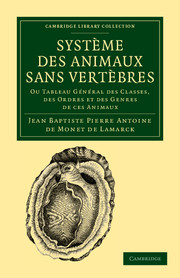
-
Select format
-
- Publisher:
- Cambridge University Press
- Publication date:
- 05 May 2012
- 22 December 2011
- ISBN:
- 9781139103824
- 9781108038058
- Dimensions:
- Weight & Pages:
- Dimensions:
- (216 x 140 mm)
- Weight & Pages:
- 0.59kg, 468 Pages
- Subjects:
- Life Sciences, Entomology, Zoology
You may already have access via personal or institutional login- Subjects:
- Life Sciences, Entomology, Zoology
Book description
The great French zoologist Lamarck (1744–1829) was best known for his theory of evolution, called 'soft inheritance', whereby organisms pass down acquired characteristics to their offspring. Originally a soldier, Lamarck later studied medicine and biology, becoming particularly interested in botany; his distinguished career included admission to the French Academy of Sciences (1779), and appointments as Royal Botanist (1781) and as professor of zoology at the Musée Nationale d'Histoire Naturelle in 1793. Acknowledged as the premier authority on invertebrate zoology, he is credited with coining the term 'invertebrates'. This work, published in Paris in 1801, expands on Linnaeus' classification system, introducing seven sub-categories, creating finer divisions along lines of the species' inherent physical traits, and describing their natural characteristics and organisation. Also included is Lamarck's museum lecture, delivered in 1800, in which he first set out his ideas on evolution.
Contents
Metrics
Full text views
Full text views help Loading metrics...
Loading metrics...
* Views captured on Cambridge Core between #date#. This data will be updated every 24 hours.
Usage data cannot currently be displayed.
Accessibility standard: Unknown
Why this information is here
This section outlines the accessibility features of this content - including support for screen readers, full keyboard navigation and high-contrast display options. This may not be relevant for you.
Accessibility Information
Accessibility compliance for the PDF of this book is currently unknown and may be updated in the future.


